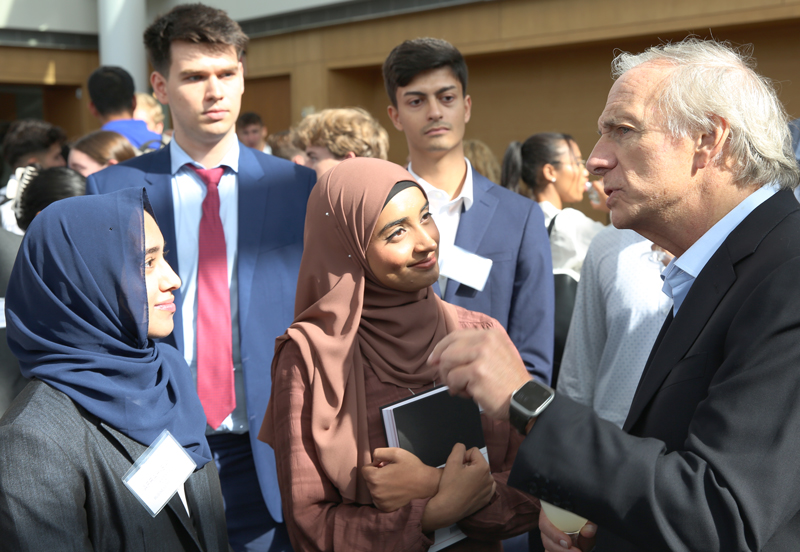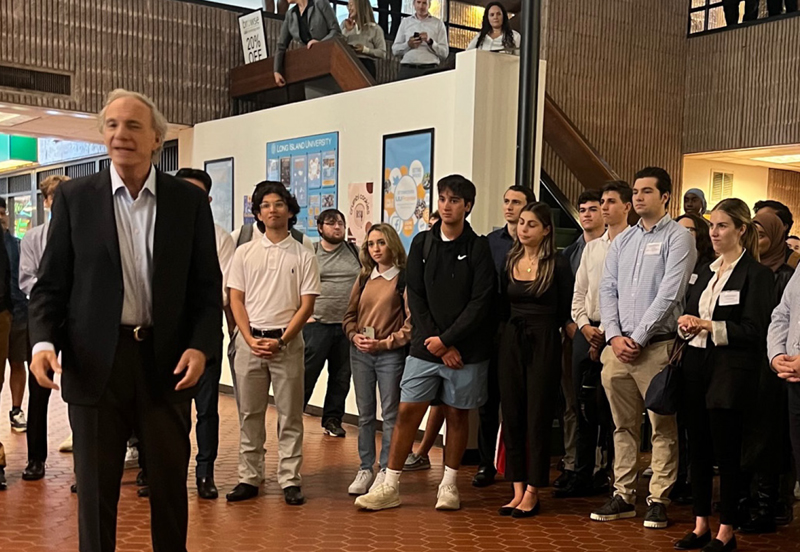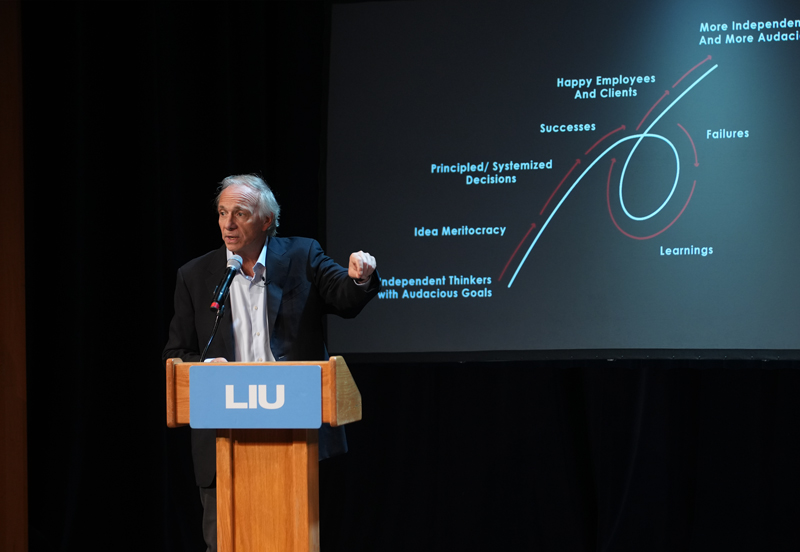When he arrived on September 19th, it had been 52 years since Ray Dalio ’71 had walked on Long Island University’s Post campus. As a cool fall breeze and sunny skies welcomed him back, it felt to Dalio like he had never left.
Even though the tree under which he studied was still firmly rooted, Dalio himself has soared since his time as an undergraduate student. In the five decades since he received his bachelor’s degree in business from LIU, Ray Dalio has become a hugely successful entrepreneur, investor and author. He is the founder of Bridgewater Associates, the fifth most important company in the United States (Fortune magazine) and the largest hedge fund in the world. He has appeared on the Time magazine 100 list of most influential people in the world and the Forbes 100 list of the world’s wealthiest. He is the author of three #1 New York Times bestsellers. The university was honored to have Ray return to share his story and his principles for success with the next generation of LIU students.
 To a packed audience of over 500 current students, in his humble manner and colloquial tone, Dalio began his talk by sharing, “You have no idea how special it is for me to be here.”
To a packed audience of over 500 current students, in his humble manner and colloquial tone, Dalio began his talk by sharing, “You have no idea how special it is for me to be here.”
Dalio went on to describe his experience at LIU Post, which was “the first school that I liked.” The pivot from a high school education of rote lecturing to a university experience with dynamic discussions and learning opportunities was transformative. “It was first time I could pick subjects that interested me. And then I had these incredible professors.
I liked the whole freedom of the place. It inspired and excited me.”
After receiving his MBA from Harvard Business School, Dalio took his affinity for the markets and his excitement for new challenges and put them to work. In 1975, he launched Bridgewater Associates from his two-bedroom New York City apartment.
His talk could have ended there, with a hugely successful company that, at its pinnacle, managed over $150 billion. But Dalio does not believe in glossing over the difficult times. Instead, he takes his time to emphasize his missteps and shortcomings, to impress upon his young audience that mistakes are the most essential steps to achieving success.
 For Dalio, failure—and then learning from failure—is more important than success. He concedes that a correct decision will move a business forward. However, without failure, stakeholders will not learn and grow from the insights gained. It was from one very public mistake and its resulting wisdom that Dalio’s “principles” were born.
For Dalio, failure—and then learning from failure—is more important than success. He concedes that a correct decision will move a business forward. However, without failure, stakeholders will not learn and grow from the insights gained. It was from one very public mistake and its resulting wisdom that Dalio’s “principles” were born.
Dalio breaks it down for the young attendees: success is a five-step process. At the beginning of the journey—or “adventure,” as Ray describes it—the first step is to establish “audacious goals.” On the road to accomplishing those goals, obstacles are encountered and mistakes are made. After reflecting on those failures and getting to their root causes, one needs to design and then execute a plan to improve. Repeat, and then repeat again.
Ray credits these systemized principles for enabling him to take Bridgewater from a two-bedroom apartment to the largest hedge fund in the world. He views principles as very individualized—what works for one will not service another. So, he encourages students to derive their own principles from their own failures, to write them down, to improve, and to continue the cycle to achieve more and more audacious goals.
Dalio uses himself as a case study of how failure can create a principle. In a very public manner, Ray made a strong prediction about the US economy in 1982—and was completely wrong. Dalio and Bridgewater suffered reputationally and financially as a result. “I was so broke, I had to borrow $4,000 from my dad.” Ray took the difficult experience, analyzed and learned from it, and acquired the understanding that PAIN + REFLECTION = PROGRESS.
Dalio endeavored to be more open minded, viewing the pain as a puzzle. By solving it, he would develop a principle he could use to deal with reality in a better way. To avoid the pain of being wrong again, he embraced the concept of idea meritocracy, where independent thinkers could challenge his ideas to develop the best answers. Combined with his theory of “radical transparency,” where honest dialogue and thoughtful disagreement would give rise to the optimal decisions, Dalio created a brand-new office culture. The results are hard to deny; Bridgewater now boasts 1,500 employees and a reputation of honesty and integrity that is unmatched in the business.
These days, Ray is still taking “adventures” and learning from mistakes, but with new goals in mind. Since retiring from Bridgewater in 2022, Dalio’s focus now is on his family, his philanthropy, and sharing his principles for success with others.
From Brookville to Bridgewater to benefactor, Ray’s principles have guided him on an incredible adventure, one that he could not have envisioned as an undergraduate student at LIU. Before the students left the Krasnoff Theater to receive a copy of Dalio’s bestselling book, Principles: Life and Work, generously donated by Ray, he emphasized to his audience that money should not be what drives them to succeed. “The important thing is that you have the life that you want to have….Consider success in the broader sense: meaningful work and meaningful relationships. I don’t think there’s one right path to success.”





